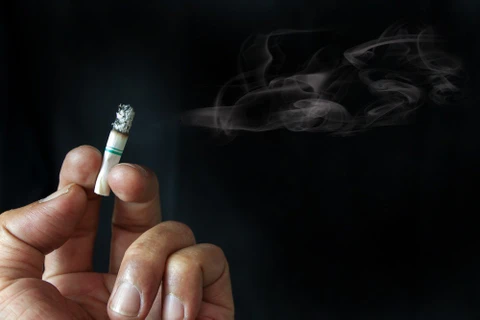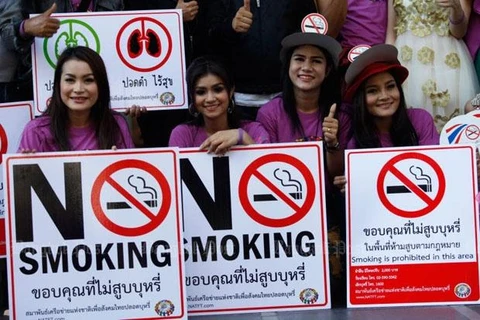Jakarta (VNA) – Tobacco not only harms people’s health but also threatens the growth of Indonesia, said an article on Jakarta Post, adding that the 2030 sustainable development goals (SDGs) provide a new opportunity for prioritising and incorporating tobacco control in every development agenda.
The article cited the latest report of the World Health Organisation (WHO) which said almost two in three Indonesian males smoke, most of whom in the age of 15-19, adding that the addiction has further dragged families into poverty as smokers can spend up to 14.5 percent of their median income to buy ten cigarettes every day.
It also noted tobacco causes 200,000 deaths annually, surpassing tuberculosis-related mortality rate which stood at 150,000 in 2015.
In addition, Indonesia has suffered annual losses of about 500 trillion IDR (37.5 billion USD) due to direct and indirect negative impacts of smoking, overweighing yearly revenue from tobacco taxes of 145 trillion IDR (10.9 billion USD).
Meanwhile, tobacco producers of the Southeast Asian country still continue to increase production and wanted to expand tobacco production.
However, tobacco production expansion will not benefit tobacco farmers, workers and the poor, according to the article. It said that big companies keep slashing the number of workers as they shift to machines. In addition, cartel-like practices in tobacco trade have undermined small and local manufacturers that rely on manual production.
Due to changing weather and monopoly practice, tobacco farmers now earn 775,000 IDR per month on average, one third of their income in the past. Tobacco cultivation also harms environment as it requires a large amount of fertilisers and pesticides which can pollute water. This business uses 4.3 million hectares of land, contributing 2-4 percent to global deforestation. Meanwhile, over 700 tonnes of cigarette butts are toxic rubbish. Additionally, tobacco manufacturing produces 2 million tonnes of solid waste every year, which demonstrates that tobacco industry perpetuates climate change.
Despite the hike of retail price of tobacco, this kind of goods is getting more affordable even for the poorest and youngest. Indonesia is likely to lose demographic bonus in the next 20-30 years if the young generation keeps smoking either actively or passively, the article said.-VNA
The article cited the latest report of the World Health Organisation (WHO) which said almost two in three Indonesian males smoke, most of whom in the age of 15-19, adding that the addiction has further dragged families into poverty as smokers can spend up to 14.5 percent of their median income to buy ten cigarettes every day.
It also noted tobacco causes 200,000 deaths annually, surpassing tuberculosis-related mortality rate which stood at 150,000 in 2015.
In addition, Indonesia has suffered annual losses of about 500 trillion IDR (37.5 billion USD) due to direct and indirect negative impacts of smoking, overweighing yearly revenue from tobacco taxes of 145 trillion IDR (10.9 billion USD).
Meanwhile, tobacco producers of the Southeast Asian country still continue to increase production and wanted to expand tobacco production.
However, tobacco production expansion will not benefit tobacco farmers, workers and the poor, according to the article. It said that big companies keep slashing the number of workers as they shift to machines. In addition, cartel-like practices in tobacco trade have undermined small and local manufacturers that rely on manual production.
Due to changing weather and monopoly practice, tobacco farmers now earn 775,000 IDR per month on average, one third of their income in the past. Tobacco cultivation also harms environment as it requires a large amount of fertilisers and pesticides which can pollute water. This business uses 4.3 million hectares of land, contributing 2-4 percent to global deforestation. Meanwhile, over 700 tonnes of cigarette butts are toxic rubbish. Additionally, tobacco manufacturing produces 2 million tonnes of solid waste every year, which demonstrates that tobacco industry perpetuates climate change.
Despite the hike of retail price of tobacco, this kind of goods is getting more affordable even for the poorest and youngest. Indonesia is likely to lose demographic bonus in the next 20-30 years if the young generation keeps smoking either actively or passively, the article said.-VNA
VNA
























